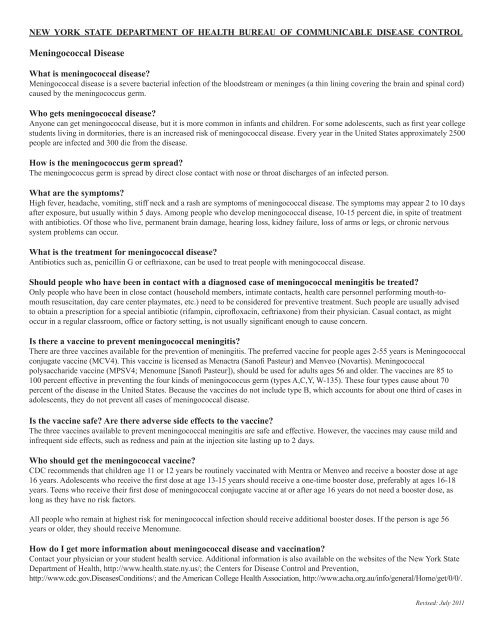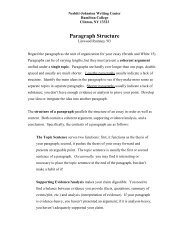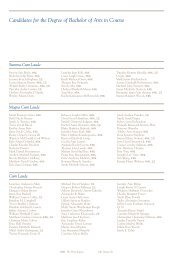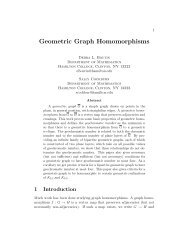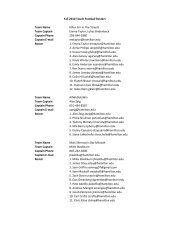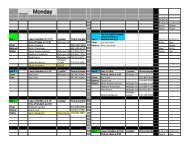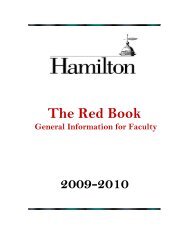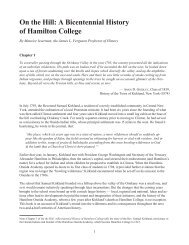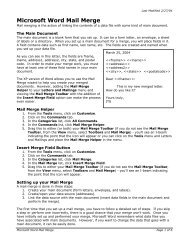Thomas Brown Rudd Health Center - Hamilton College
Thomas Brown Rudd Health Center - Hamilton College
Thomas Brown Rudd Health Center - Hamilton College
Create successful ePaper yourself
Turn your PDF publications into a flip-book with our unique Google optimized e-Paper software.
NEW YORK STATE DEPARTMENT OF HEALTH BUREAU OF COMMUNICABLE DISEASE CONTROL<br />
Meningococcal Disease<br />
What is meningococcal disease<br />
Meningococcal disease is a severe bacterial infection of the bloodstream or meninges (a thin lining covering the brain and spinal cord)<br />
caused by the meningococcus germ.<br />
Who gets meningococcal disease<br />
Anyone can get meningococcal disease, but it is more common in infants and children. For some adolescents, such as first year college<br />
students living in dormitories, there is an increased risk of meningococcal disease. Every year in the United States approximately 2500<br />
people are infected and 300 die from the disease.<br />
How is the meningococcus germ spread<br />
The meningococcus germ is spread by direct close contact with nose or throat discharges of an infected person.<br />
What are the symptoms<br />
High fever, headache, vomiting, stiff neck and a rash are symptoms of meningococcal disease. The symptoms may appear 2 to 10 days<br />
after exposure, but usually within 5 days. Among people who develop meningococcal disease, 10-15 percent die, in spite of treatment<br />
with antibiotics. Of those who live, permanent brain damage, hearing loss, kidney failure, loss of arms or legs, or chronic nervous<br />
system problems can occur.<br />
What is the treatment for meningococcal disease<br />
Antibiotics such as, penicillin G or ceftriaxone, can be used to treat people with meningococcal disease.<br />
Should people who have been in contact with a diagnosed case of meningococcal meningitis be treated<br />
Only people who have been in close contact (household members, intimate contacts, health care personnel performing mouth-tomouth<br />
resuscitation, day care center playmates, etc.) need to be considered for preventive treatment. Such people are usually advised<br />
to obtain a prescription for a special antibiotic (rifampin, ciprofloxacin, ceftriaxone) from their physician. Casual contact, as might<br />
occur in a regular classroom, office or factory setting, is not usually significant enough to cause concern.<br />
Is there a vaccine to prevent meningococcal meningitis<br />
There are three vaccines available for the prevention of meningitis. The preferred vaccine for people ages 2-55 years is Meningococcal<br />
conjugate vaccine (MCV4). This vaccine is licensed as Menactra (Sanofi Pasteur) and Menveo (Novartis). Meningococcal<br />
polysaccharide vaccine (MPSV4; Menomune [Sanofi Pasteur]), should be used for adults ages 56 and older. The vaccines are 85 to<br />
100 percent effective in preventing the four kinds of meningococcus germ (types A,C,Y, W-135). These four types cause about 70<br />
percent of the disease in the United States. Because the vaccines do not include type B, which accounts for about one third of cases in<br />
adolescents, they do not prevent all cases of meningococcal disease.<br />
Is the vaccine safe Are there adverse side effects to the vaccine<br />
The three vaccines available to prevent meningococcal meningitis are safe and effective. However, the vaccines may cause mild and<br />
infrequent side effects, such as redness and pain at the injection site lasting up to 2 days.<br />
Who should get the meningococcal vaccine<br />
CDC recommends that children age 11 or 12 years be routinely vaccinated with Mentra or Menveo and receive a booster dose at age<br />
16 years. Adolescents who receive the first dose at age 13-15 years should receive a one-time booster dose, preferably at ages 16-18<br />
years. Teens who receive their first dose of meningococcal conjugate vaccine at or after age 16 years do not need a booster dose, as<br />
long as they have no risk factors.<br />
All people who remain at highest risk for meningococcal infection should receive additional booster doses. If the person is age 56<br />
years or older, they should receive Menomune.<br />
How do I get more information about meningococcal disease and vaccination<br />
Contact your physician or your student health service. Additional information is also available on the websites of the New York State<br />
Department of <strong>Health</strong>, http://www.health.state.ny.us/; the <strong>Center</strong>s for Disease Control and Prevention,<br />
http://www.cdc.gov.DiseasesConditions/; and the American <strong>College</strong> <strong>Health</strong> Association, http://www.acha.org.au/info/general/Home/get/0/0/.<br />
Revised: July 2011


